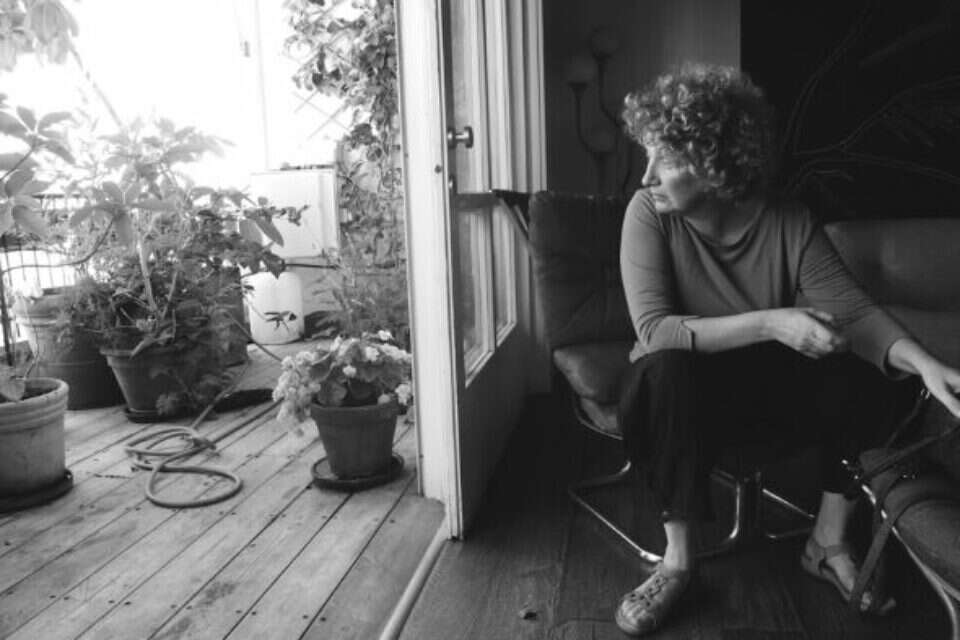When you think about the new book by Orly Castle-Bloom in relation to her first stories, a kind of mirror image is created - a reversal that is also the same thing.
Here there are no corpses and bleeding or a mother drawing the map of the Land of Israel on top of the baby she found in a bag.
The horrors are gray.
Instead of in the nightmarish darkness of the soul or in the suburban apartment, "not far from the city center" (as the name of her first collection of stories), they happen outside, in broad daylight and in the city center - near the London Ministry in Tel Aviv.
The house, which in many of the first stories was a nest of madness, is now a last refuge of sanity from the horror outside.
But in the end this is the same house, whose vacillation between horror and refuge from it is what makes it what it is.
The protagonist, Mr. Joseph Schimmel, the relaxed and good-natured man, lives in a noisy and sooty apartment he bought on Shaul Hamelech Boulevard in Tel Aviv, which does not really manage to protect him from the chaotic life outside: he hears the bus announcements very well, smells the gas fumes and sees the red and blue lights of the police and rescue vehicles when they are trapped in the window panes.
He doesn't feel at home, but since he was fired from his job as a non-permanent foreign teacher in the department of French culture at Tel Aviv University, he spends his days in seclusion.
If it weren't for the neighborhood walks with his dachshund-like dog, he wouldn't go out almost at all and would spend his days taking care of the many things housed in his apartment.
He defines his life as "a life in which the only task I impose on myself as a person is to live, with all the maintenance of the house and the contents of the house, which also includes me."
His forays out of the unprotected shelter of his apartment are short explorations in the brutality and misery of central Tel Aviv.
It is not for nothing that this book is called "Biotope", as the name of the research work of the students of the biology major on the habitats of various organisms.
Like a curious student who turns over a stone to discover the creepers crushed under it, Joseph Schimmel also maps the wretched creatures he sees under his house, the homeless and addicts from the nearby clinic, which provides them with the drug substitute methadone, and characterizes them: "Ninety degrees" He is the one who walks as if he is folded in half, "One Hundred and Eighty Degrees" is the one whose head is facing the opposite of its original direction, "Floating Hat" is the one whose small head disappears inside the casket, and next to them are "the man with the nylons", "the office", "the walker" and more.
The research project at "Biotope" is based on observations of the surface: there is no desire here to decipher "from the inside" the lives of street urchins (when Joseph Schimmel does not see how many of them he simply notes that they have not been observed anymore; at most he writes that they may have passed away ).
There is also no desire here to crack down on the local real estate market and its injustices. These are in any case crying out to the sky, visible, you don't even have to lift a stone to discover them. It is enough to see that next to the fateful people around London Minster, from the other side of the street, delegations of laborers regularly commission Cleaning the decorative pool at the foot of the glittering tower, to suck out the dirt that interferes with the beautiful movement of the ripples.
The look here is not a penetrating and invasive look - it's a dazed look.
Joseph Schimmel sees and hears what can be seen and heard with an easy walk, an easy conversation, and keeps a constant distance of question from it.
He is not angry, does not protest out loud, is not anxious, does not fantasize about what is happening beyond his reach, does not empathize to the point of collapsing the distance of observation.
He overlooks a landscape that seems to us to be completely normal, even though there is nothing normal about it.
The blankness includes a second-order question - it not only asks what I see, but how is it that I haven't seen it until now?
Or: How do you get used to it so much that you stop seeing it?
Joseph Schimmel's observations of his ecological habitat reveal around him countless local reflections of home and no-home, which later in the book also take on national meanings, when he starts working for a company that helps new immigrants from France acclimate to their national home.
The national home is also perceived here, above all, in a non-metaphorical sense ("immigrating to Israel is like returning to the parental home. When a person returns to his parents, he feels at the same time both rejection and belonging, both failure and security... a natural contradiction, with three exclamation marks" ), and Schimmel becomes entangled in the connection between the national home and his own double physical one, as a native of France and the son of a Jewish father and a Protestant mother, who has two national homes and in fact not one.
Joseph Schimmel's wanderings around his double houses in an attempt to explore the concept of the home (in YouTube, perhaps), will also reveal to him, as expected, the gap between the symbolic perception of the home as a protected place and its physical fragility: an accumulation of plaster, doors and glass, Who can't really withstand the burst and protect him from the sizzling jungle out there.
But precisely the part of the book where the plot runs and the types become more grotesque and funnier, also violates the fine and nuanced balance of the tone of remote despondency, the one that plays on the threshold between the domestic and what Freud called the non-domestic (the stranger who is precisely in the heart of the familiar).
Castle Bloom's writing is amazing to observe the Israeli obsession with the house, not because it goes deep or reveals something about it that we didn't know before, but precisely because she herself is so ungrounded: she doesn't give her readers much to cling to except her very typical voice.
She does not need the sensational solid insights about the delusional state of the Israeli real estate market to anchor herself in them. Her anchor is above all in the intonation that is so identified with her, which embeds in every sentence the stupid look through which she tells about what George Schimmel Denominator our "Ground Zero" - the disaster area which is our most transparent and stable day-to-day.
Orly Castel-Bloom, Biotope, The New Library, 233 p.
were we wrong
We will fix it!
If you found an error in the article, we would appreciate it if you shared it with us













